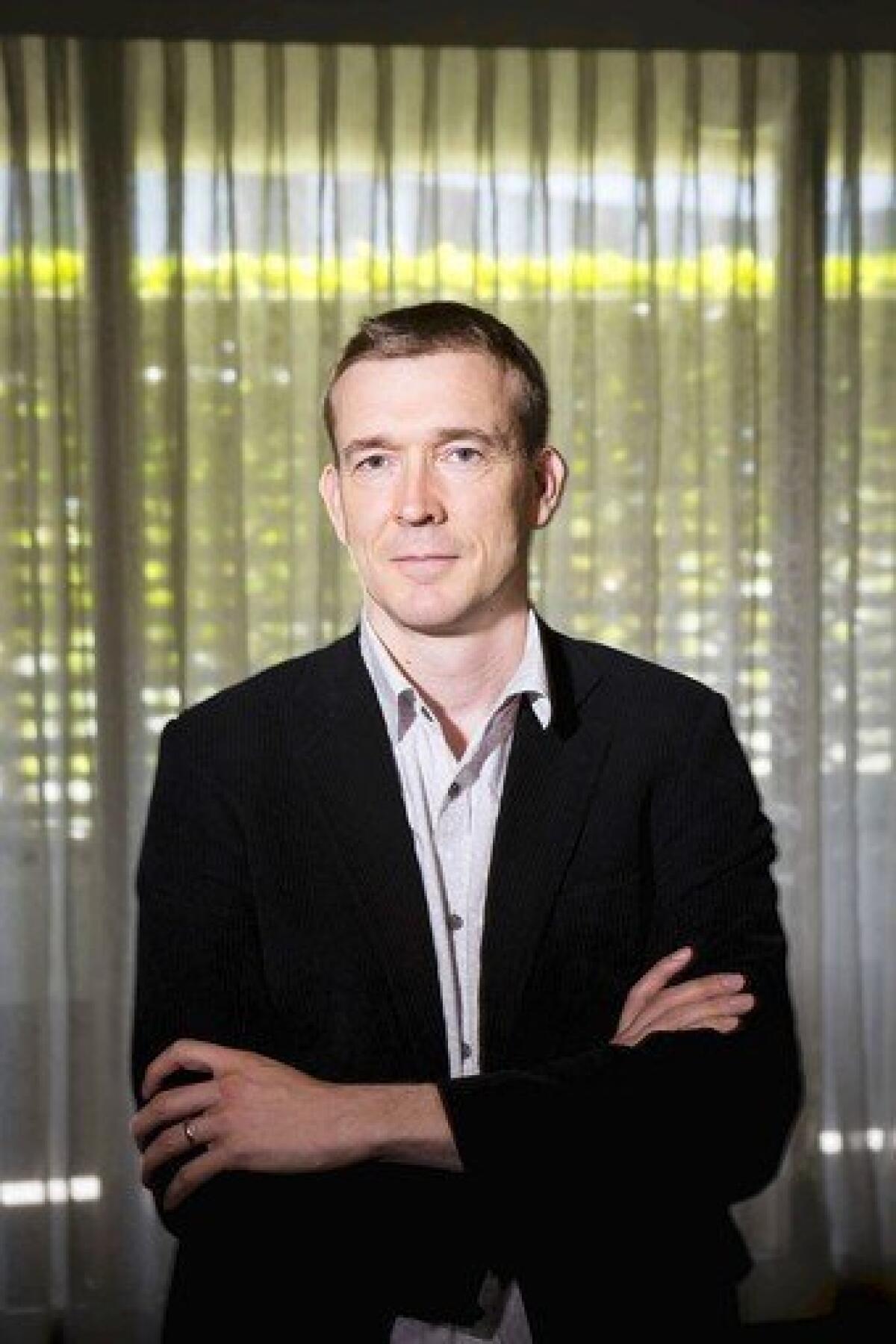David Mitchell basks in ‘Cloud Atlas’ boost

- Share via
No strangers approach David Mitchell for an autograph as he eats lunch at a Japanese restaurant on Sawtelle Boulevard. Nor does anyone bother him when he stops by Diesel Books in Brentwood to sign copies of his novel. The acclaimed British author of “Cloud Atlas” looks like a slightly hip literature professor, a lean 43-year-old in a wide-wale corduroy jacket.
The $102-million movie version of “Cloud Atlas,” directed by the Wachowskis and Tom Tykwer, might just take Mitchell from well-regarded to widely known. He even makes a cameo in the film, playing a futuristic double agent.
The movie has already provided a considerable boost for the book, a labyrinthine literary novel first published in the U.S. in 2004. When the five-minute trailer was posted online in late July, orders for the book cascaded in; publisher Random House rushed an extra 125,000 copies into production.
“Random House was surprised, people all over the world who think about the marketing effects of trailers were surprised,” Mitchell says. “I’m still surprised.”
Mitchell didn’t set out to be a writer as a child in the U.K. Rattling around after college, he moved to Japan, where he taught English. He went there for work, for experience and for a woman he’d fallen in love with. He’s now married — not to her, although he admits that would make a nice story — and the two live in the west of Ireland, with children, 7 and 10.
While living in Japan, Mitchell tried to write a novel — “a big unpublishable sprawling mess of a manuscript,” he calls it. In those pre-Internet days, he prevailed upon his mother to send him a book of publishing contacts. She did, but nobody bit.
“I am now very happy indeed that it never did see the light of day,” he says. Messy as it was, the work was strong enough to land him an agent. Prize recognition followed for his first two books, “Ghostwritten” and “Number9Dream,” both of which toyed with voice, form and intertextuality.
The innovative, unconventional structure of “Cloud Atlas,” often compared to Russian nesting dolls, made the novel seem unfilmable. On top of the impossible narrative structure, the book spans centuries and continents; its scenes include a 19th century South Sea island, a hyper-technologically advanced future Korea and a dystopian Hawaii.
When it was optioned, Mitchell saw it as a nice paycheck, nothing more.
“I didn’t really think about it all that much. Writers are so used to books being optioned and then the movie never happens,” he says. “It’s a beginner’s mistake to assume, ‘Oh, great, it’s optioned, when will it be at the multiplex?’”
And yet, against all odds, “Cloud Atlas” is coming Oct. 26. What does Mitchell think of it?
“Wow,” he says, then pauses. “There’s a primal, if I may, ontological wow.”
Mitchell is a casually intelligent writer, as comfortable referencing the metaphysics of reality in conversation as in his books. He appreciates that the movie ignores the old-fashioned line between high and low culture, something he’s done in his novels.
“Who says art has to be one or the other? This film isn’t. This film’s both,” he says. “It’s got lines, if you wish to stop to think about them, with a lot to unpack. It’s also got a flying snowmobile that shoots lasers!” He laughs with delight — there were no flying snowmobiles in his book.
Most authors will say, as Mitchell does, that they are writers first. But few are quite as steeped in language as Mitchell is.
“I think words operate like musical notes that the eyeball hears,” he says. He draws spikes in the air to illustrate the word “perhaps” and shapes a blob to describe “maybe.”
“The words ‘maybe’ and ‘perhaps’ are literally the same — the flavor is the same, the educational level is the same. But you just know when to use maybe and when to use perhaps,” he says. “I think it’s because of this: You get to know the tastes or musical tastes of words themselves, and this informs your choice, whether you use them or not.”
Mitchell can geek out on words at length — try asking him what he thinks of the letter “Y,” or when it’s better to end an adjective with “-ish” or “-esque.” When he writes, he puts different kinds of words in different characters’ mouths; in “Cloud Atlas,” he juggles a number of dialects: a post-apocalyptic pidgin, a self-taught robot, 18th century sailors and preachers, a weaselly yet lovable contemporary vanity publisher.
He pays equally close attention to the macro, carefully attending to setting, character and plot.
“I think about this a lot — to what degree the writer needs to get this kind of stuff right, to know it, even if it isn’t in the book,” he says. “I think that’s the difference between the imitation teak table and the real teak table. It looks the same, but just you know, don’t you?” He knocks on the tabletop. “You know when you do this. It’s your job. It really is your job.”
Writing is a way Mitchell filters the world; when in a new place, he takes what he calls “textual photographs” — five decent sentences to describe what he sees. He can write almost anytime, anywhere; he pulls out his Moleskine notebook and shows me what he wrote when he woke up that morning at 4 a.m. At home in Ireland, he writes in a studio out back that he calls a hut, or sometimes in a place in town.
After “Cloud Atlas,” Mitchell’s novels became less experimental in form. 2010’s “The Thousand Autumns of Jacob De Zoet,” a historical novel set in Edo-era Japan, employed multiple voices and dialects but moved forward in time. Even more conventional was “Black Swan Green,” a coming-of-age story that tapped Mitchell’s experience growing up bookish and with a stammer.
That stammer, still apparent two years ago, has now been erased. Mitchell is camera-ready for a schedule packed full with appearances to promote “Cloud Atlas.”
Whatever happens with the movie version of “Cloud Atlas,” Mitchell is far too steeped in words to do anything but write books. He’s well along on the next novel; if things go as planned, it will have multiple voices, a fairly standard chronology and some scenes in a future world.
“When I think about it, I’m happily bewildered that people will preorder my books,” he says. “They’ll preorder me. What a lucky guy!”
More to Read
Sign up for our Book Club newsletter
Get the latest news, events and more from the Los Angeles Times Book Club, and help us get L.A. reading and talking.
You may occasionally receive promotional content from the Los Angeles Times.







